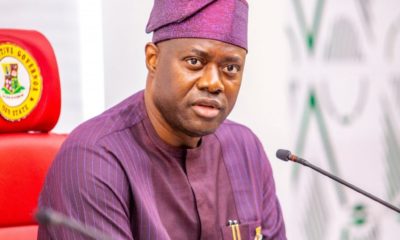Oil
Nigeria to remove oil subsidy
ABUJA—Nigerian Government plans to totally remove fuel subsidy and use the proceeds for the provision of free and compulsory primary/secondary education across the country. The administration is also said to be working on unbundling the Nigerian National Petroleum Corporation, NNPC, to make it more efficient in the production and delivery of products to Nigerians.
These proposals form part of the strong recommendations made by the transition committee raised by Buhari to work out a blueprint for his administration. Asked if the proposal for total subsidy removal had been discussed with labour, the source said that members of organized labour in the country were consulted by the committee and they made presentations on what should be done over the matter.
The source said: “ Labour is part of the decision; they have accepted the proposal of fuel subsidy removal. “A committee is likely to be set up by the federal government to work out the modalities of what is to be done in that respect. “But the truth is that total removal of fuel subsidy has been recommended with adequate provisions for palliatives on free education and social welfare for the unemployed”, a member of the transition committee said. The source pointed out that unlike in the past, the Buhari administration is considering the provision of free meals for students to serve as incentives for them to enroll in school.
The source explained that the committee also recommended the unbundling of NNPC to reposition the agency to serve the needs of Nigerians better. According to him, all refineries in Nigeria are to be made to work at maximum capacity by the federal government to be able to deliver adequate products to the consumers. Corruption He said that the era of allocating more crude than any refinery in Nigeria can process was over, as it was discovered that the policy encouraged corruption and diversion of funds. In a tone that suggested that the Buhari administration might probe the operations of the NNPC, the committee member further disclosed that the federal government was set to block all channels of fund leakages in the corporation.
He said: “The federal government is keen on plugging all areas of leakages in the corporation and whoever must have caused them must be made to account for such unpatriotic wastages. We don’t know whether that is what you call probe or not”, he said. It could not be established as at last night whether such decisions of the officials were influenced by the planned beaming of search light on the operations of the government agency.
FG to pay the controversial N160 billion subsidy claims Meanwhile, hopes for resolution of outstanding subsidy issues hampering normal supply of petroleum products across the country appear kindled as the special investigation team on subsidy claims verification recommends payment of the controversial N160 billion claimed by oil marketers. As a result, bankers have resumed credit lines to the sector while importation by marketers have resumed though it is still on cautious notes.
The supply shortages witnessed across the country since last month was as a result of a disagreement between the federal government and oil marketers over the subsidy claims resulting in the marketers’ refusal to import more products under the subsidy programme. In the last week of ex-president Goodluck Jonathan’s administration, the finance ministry had paid a part of the subsidy claims totaling about N131 billion in the wake of the supply crises arising from this disagreement.
The former Minister of Finance, Dr Ngozi Okonjo-Iweala, had doubted the additional N160 billion claims ascribed to exchange rate differential and interest rate charges on banks’ funding for the petroleum products imports. She had subsequently set up a special investigative team made of representatives of Petroleum Products Pricing Regulatory Committee (PPPRC), Central Bank of Nigeria (CBN), the Debt Management Office (DMO) and the finance ministry to investigate the claims before she can approve the payment.
The team couldn’t conclude their assignments before the expiration of ex-president Jonathan’s government and exit of the minister, hence validating the allegation of some of the marketers that the investigative team was designed to provide escape for the ministry from the agreement they had reached on subsidy payment. The marketers had also wondered why the setting up of the team whereas this assignment has always been done by PPPRC without any issues.
Return of confidence Bankers who spoke to Vanguard last week said that their confidence was gradually returning to the oil marketing sector which they had classified as ‘high-risk’ in the wake of the subsidy claims disagreement, indicating that some of them have resumed granting loans to the sector. The disagreement had put about N300 billion banks’ risk assets (loans) in danger of default, escalating the industry non-performing loan ratio to almost 4.0 per cent with the worst performing banks hitting above 8.5 per cent aggregate and over 40 per cent on the oil sector.
The industry red line is 5.0 per cent at which any bank’s exposure would be dangerous and unacceptable. Top executives of the oil marketers’ associations told Vanguard that they have information that the investigative team has validated the marketers’ claims in their report to the finance ministry two weeks ago. However, they said that actual payment is waiting for the settling down of President Muhammadu Buhari’s government, a situation which they also said cannot last for too long otherwise the renewed confidence of their funding banks may wane.
One of the marketers informed that following a meeting with the permanent secretary, Ministry of Petroleum Resources two weeks ago, some of them have begun importation of products on a low scale while helping the Nigerian National Petroleum Corporation (NNPC) to distribute its stock to lessen the supply crises. The focused cities are Abuja and Lagos which according to him has been very successful.
He added that the agreement reached with the ministry was just a palliative to welcome the new government of Muhammadu Buhari, adding that eventually they will have to address the issue in a more lasting policy. The marketers associations, according to him, are unanimous in pushing for removal of subsidy, but probably they will recommend a phased programme lasting not more than six months.
-Vanguard
Oil
NNPC Targets 60% Methane Emission Reduction By 2031
The Nigerian National Petroleum Company Limited (NNPC) has unveiled a bold strategy to reduce methane emissions in the oil and gas sector by 60% by 2031, with an ultimate goal of achieving net-zero emissions by 2060.
This announcement reinforces Nigeria’s leadership role under the Global Methane Pledge initiative and its commitment to tackling climate change.
The Group Chief Executive Officer of NNPC, Mele Kyari, disclosed these plans during a meeting on Thursday with Robert Leahman, the U.S. State Department’s Global Methane Program Manager, and a delegation from Deloitte.
READ MORE: Atiku Gloats Over AUN’s Achievements Ahead Of 20th Anniversary
The discussions, held at the NNPC Towers in Abuja, focused on collaborative efforts to reduce methane emissions through innovative and sustainable practices.
“Reducing methane emissions is not just an environmental necessity but also a strategic imperative for Nigeria’s energy transition. We are leveraging partnerships to adopt global best practices and innovative solutions,” Kyari stated.
Key among these efforts is a pilot project in the Niger Delta, aimed at establishing emissions baselines, mitigating methane leaks, and promoting sustainable operations across Nigeria’s energy sector.
The project, a partnership between NNPC, Deloitte, and the U.S. Bureau of Energy Resources, will utilize data-driven methodologies to pinpoint and address methane hotspots.
Robert Leahman commended Nigeria’s proactive stance, describing it as a benchmark for other nations on the continent.
“Nigeria’s leadership under the Global Methane Pledge sets a standard for the continent. These initiatives will not only help reduce emissions but also drive sustainable development in the energy sector,” he said.
Kyari highlighted the broader benefits of addressing methane emissions, noting its significance for both environmental protection and economic efficiency.
“This collaboration is a game-changer. By addressing methane leaks, we’re reducing waste, saving costs, and protecting the environment. It’s a win-win for our economy and the planet,” he added.
Oil
FG Introduces New Incentives To Revitalize Nigeria’s Oil & Gas Industry
In a strategic move to revitalize Nigeria’s oil and gas sector, the Federal Government has unveiled two key fiscal incentives aimed at attracting investment and enhancing energy security.
The announcement was made by Mr. Wale Edun, the Minister of Finance and Coordinating Minister of the Economy on Wednesday.
The first initiative, the Value Added Tax (VAT) Modification Order 2024, introduces critical exemptions for essential energy products and infrastructure, including Diesel, Feed Gas, Liquefied Petroleum Gas (LPG), Compressed Natural Gas (CNG), Electric Vehicles, Liquefied Natural Gas (LNG) infrastructure, and Clean Cooking Equipment.
Read Also: Atiku Calls For Rotational Presidency Across Nigeria’s Geopolitical Zones
These exemptions are designed to reduce living costs for Nigerians, promote energy security, and accelerate the transition to cleaner energy alternatives.
The second initiative, the Notice of Tax Incentives for Deep Offshore Oil & Gas Production, offers new tax relief options for deep offshore exploration projects.
This measure aims to position Nigeria’s deep offshore basin as a premier destination for international oil and gas investments, boosting the country’s appeal to foreign investors.
These reforms are part of a broader set of policy initiatives, known as Policy Directives 40-42, endorsed by President Bola Ahmed Tinubu.
The directives reflect the administration’s commitment to fostering sustainable development in the energy sector and enhancing Nigeria’s competitive edge in the global oil and gas market.
Business
Tinubu set to approve ExxonMobil-Seplat oil deal, expands CNG bus initiative

By Yemie Adeoye
NIGERIA’s President Bola Tinubu has announced that the protracted ExxonMobil-Seplat upstream oil divestment will be formally approved by the Minister of petroleum within a matter of days, just as he announced his government’s intention to expand the Compress natural Gas, CNG buses initiative.
The President who stated this during his Independence day nationwide broadcast stated that the move is in line with his administration’s commitment to free enterprise, free entry and free exit in investments which is the hallmark of his administration investment policy.
“Fellow compatriots, our administration is committed to free enterprise, free entry, and free exit in investments while maintaining the sanctity and efficacy of our regulatory processes. This principle guides the divestment transactions in our upstream petroleum sector, where we are committed to changing the fortune positively. As such, the ExxonMobil Seplat divestment will receive ministerial approval in a matter of days, having been concluded by the regulator, NUPRC, in line with the Petroleum Industry Act, PIA. This was done in the same manner as other qualified divestments approved in the sector.”
The President also seized the opportunity to plead with Nigerians to be patient with his administration’s reform policies. “As your President, I assure you that we are committed to finding sustainable solutions to alleviate the suffering of our citizens. Once again, I plead for your patience as the reforms we are implementing show positive signs, and we are beginning to see light at the end of the tunnel”.
“Our energy transition programme is on course. We are expanding the adoption of the Presidential Initiative on Compressed Natural Gas for mass transit with private sector players. The Federal Government is ready to assist the thirty-six States and FCT in acquiring CNG buses for cheaper public transportation.
Fellow Nigerians, while we are working to stabilise the economy and secure the country, we also seek to foster national unity and build social harmony and cohesion. Our economy can only thrive when there is peace”. he enthused.





















